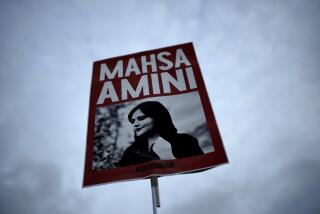Iraq Sentences Journalist to Die on Spy Charge : Mideast: The reporter, an Iranian exile, was investigating a blast in a weapons complex for a British paper.
CAIRO â A British-based journalist who had been investigating reports of a mysterious explosion at a weapons complex near Baghdad was sentenced to death Saturday by an Iraqi revolutionary court that found him guilty of spying.
Farzad Bazoft, a stateless Iranian exile working for Britainâs weekly Observer newspaper, was sentenced after a five-hour, closed-door trial that also resulted in the conviction of a 52-year-old British nurse charged with helping Bazoft.
The nurse, Daphne Parish, accused of driving Bazoft to the weapons facility 40 miles south of Baghdad, was sentenced to 15 years in prison. An unidentified Iraqi also charged in the case received a 10-year sentence for communicating government secrets to a foreigner, according to the British Foreign Office.
The sentences drew a swift and outraged response from the British government, which monitored the trial and complained that no evidence was produced to warrant the sentences.
âWe utterly deplore these harsh and excessive sentences. . . . They come ill from a regime which is trying to show a more liberal face to the world,â the Foreign Office said in a statement.
Iraq has come under repeated criticism from human rights organizations, which in recent months have reported that abuses ranging from arbitrary arrests to torture and political executions persist in Iraq despite President Saddam Husseinâs recent moves toward political reform.
Observer editor Donald Trelford, in a statement Saturday, described the sentences as âbarbaric and unjustâ and called for Britain to withdraw its ambassador from Baghdad and cancel offers of export credit to Iraq.
âThe Observer proclaims the innocence of its reporter, who was only doing his job,â Trelford said.
Bazoft, 32, an Iranian native who had lived in Britain for several years and traveled with British documents, was arrested at Baghdad airport Sept. 15 after what his editors said was a working visit to Iraq at the invitation of the Iraqi government.
While in Iraq, Bazoft, who had worked for the Observer since 1986, investigated reports of an Aug. 17 explosion at the huge Al Iskandaria military complex. Another British newspaper, the Independent, said the blast resulted in as many as 700 deaths.
The Iraqis described the incident as a relatively minor explosion at a fuel depot that killed only 19.
Bazoft had befriended Parish, a senior nursing administrator for the Irish-run Ibn al Bitar hospital in Baghdad, according to British news accounts, and the nurse was subsequently accused of driving Bazoft to the plant where the explosion allegedly occurred.
Two months after his arrest, Bazoft, looking exhausted and strained, appeared on Iraqi television and confessed to being an Israeli agent. In a subsequent meeting with British consular officials, he continued to proclaim his innocence.
Even before formal charges were brought, Iraqâs official newspapers accused Bazoft of spying for Britain and shrugged off Western criticism of the arrests. âWhat is Iraq to do?â the daily Al Iraq asked. âOffer him sweets and give him an official send-off at the airport? Iraq is not a garden of the house of Maggie, or a part of the British empire.â
But the Observer said Bazoft had sought official permission to visit the military complex, had told the newspaperâs foreign desk of his movements and talked openly about the visit to his colleagues upon his return to Baghdad.
âNone of this conduct is consistent with espionage. It is entirely consistent with journalism,â Trelford said.
Britainâs Press Assn. news service reported that British officials have already forwarded a request for clemency on behalf of Bazoft and Parish. The Iraqi ambassador in London was summoned to the Foreign Office to be told of the governmentâs âutter dismayâ at the sentences, the agency said.
Under Iraqi law, no appeal of the sentences is permitted.
More to Read
Sign up for Essential California
The most important California stories and recommendations in your inbox every morning.
You may occasionally receive promotional content from the Los Angeles Times.










